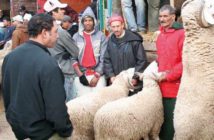Linda Pappagallo | Green Prophet
The Medicinal Plants Association in Egypt helps preserve biodiversity and is one of the 25 winners of the Equator Prize 2012.
Policy making within the realm of “development” is often burdened by an excessively westernized design resulting in unintended consequences on the welfare of local populations. For example, a previous Green Prophet article “Morocco’s Berbers Had Water Management Sorted“, reveals how water management interventions led by the Word Bank replaced traditional water systems and eventually resulted in even poorer social and environmental outcomes.
Fortunately it is becoming increasingly popular for multilateral development initiatives to provide incentives for traditional practices in environmental preservation and economic development rather than replacing, renewing or reforming existing practices which have been built on years of knowledge and perfected after generations of creative design. The Equator Initiative: A partnership for Resilient Communities, is an example of this movement in the “development” world which honors practices that aim to create societies and socio-economic landscapes that are resilient to environmental destruction and cultural erosion.
Through the biannual Equator Prize, the Equator Initiative recognizes 25 outstanding local projectsthat work to advance sustainable development solutions for people, nature and resilient communities. To date 152 community organizations have been awarded the Equator Prize and in June 2012, representatives of winning communities participated in the UN Conference on Sustainable Development (Rio+20), which was held in Brazil. This year the Middle East North Africa region was well represented by two Equator prize winners: the Medicinal Plants Association St. Catherine from Egypt and Amsing Association from Morocco.
In Egypt the Medicinal Plants Association St. Catherine supports the development of livelihood alternatives for the Bedouin populations of Sinai’s St. Catherine Reserve, through the protection of its genetic medicinal plant heritage and cultivation of endemic species. The reserve is home to roughly half of the country’s botany, four hundred and seventy two different species of plants of which more than one hundred are used for medicinal reasons and many are unique and endangered species which have been threatened by overharvesting and overgrazing. The Medicinal Plants association promotes home gardens, provides alternative energy solutions, gives hands-on training on sustainable harvesting techniques, and creates market supply chains for locally produced medicinal herbs, handicrafts and honey. For example part of the livelihood program focuses on supporting female Bedouin farmers from planting through to the marketing phase of the products, the revenues from the activities are then invested in a rotating fund which allows the community to access small loans. So far, the project has created over two hundred jobs, and has improved the living conditions of over one thousand people.
In Morocco Amsing Association was created by the villagers of Elmoudaa, an Amazirght (Berber) community located in the High Atlas Mountains, to address economic isolation, a lack of social services, and harsh climatic conditions. The association has successfully regenerated degraded lands surrounding their village through a traditional land management practice called ‘azzayn’ which bans herders from grazing in protected lands.
The reintroduction of this regulatory system has allowed native grasses and shrubs to thrive, reduced soil erosion, and prevented flooding. The association has also undertaken a number of infrastructure projects to promote community-based adaptation to climate change and resilience in the face of climate variability.
A ‘water chateau’ stores fresh water for use in times of drought or when floods wash away irrigation ditches, while a water tower provides local residents with access to clean drinking water.
It is encouraging to see these projects flourish and it would be nice to see more winners from the MENA region in the next cycle of prizes in 2014. If Green Prophet readers know of projects that would fall in line with the Equator Initiative’s objectives then invite them to apply for the Equator Prize in 2014! Here is the list of eligible countries, eligibility requirements and selection criteria from the Equator Prize 2012.
Images of Medicinal Plants Association and Amsing via The Equator Initiative and Egypt Independent









